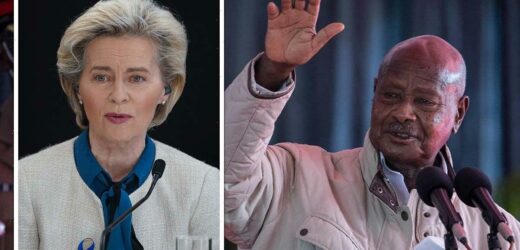Russian oil ban not enough to stop them funding war says expert
We use your sign-up to provide content in ways you’ve consented to and to improve our understanding of you. This may include adverts from us and 3rd parties based on our understanding. You can unsubscribe at any time. More info
Since Russia’s invasion of Ukraine on February 24, Western countries like the US, UK and the EU have taken steps to end or phase out their imports of Russian oil, coal, and natural gas. While the US and UK have taken more massive and ambitious steps, the EU has lagged behind in reducing its dependence on Moscow. A major reason for this reluctance in ending fossil fuel imports is that the bloc is heavily dependent on Russian gas, relying on Moscow for 58.2 percent of its energy imports last year.
While the fuel-starved continent scrambles to boost its energy security, Yoweri Museveni, Uganda’s President, has extended his hand to help.
The African country only recently discovered its massive oil reserves in 2006 underneath Lake Albert.
After that, the country signed a $10billion dollar deal with French company TotalEnergies to develop its oil production and supply capabilities.
In an editorial titled: “Africa can help solve the energy crisis”, Mr Musveni said: “In light of the Ukraine war, the West, too, would do well to consider a change in policy – and initiatives like the Lake Albert basin oil project may form part of the answer.


“By investing in oil and gas deposits in friendly nations such as Uganda, Europe could decrease its reliance on hostile nations.
“It is bizarre that European countries are so reticent about following this path.
“What’s more, the African continent produces just a fraction of global carbon emissions.
“Were sub-Saharan Africa (minus South Africa) to triple its electricity consumption overnight, for instance, it would add just 0.6 per cent to global emissions.”

Earlier this year, TotalEnergies signed a deal to build the world’s longest heated pipeline, which would make landlocked Uganda an oil producer for the first time.
While the reserves were discovered in 2006, a string of problems, including figuring out how to build to 1,443-km electrically heated pipeline needed to export the crude via Tanzania, meant that the project was delayed
After facing criticism from climate change activists, Total noted that the oil project was in line with the firm’s strategy of only approving new projects that were “low-cost and low commissions”.
Uganda believes that by 2025, oil production from the Tilenga project operated by Total and the Kingfisher project operated by Chinese Cnooc will reach a combined 230,000 barrels a day, making it one of the largest oil producers in Africa.
DON’T MISS:
How the UK, US and their allies could respond to a nuclear attack [REPORT]
Russia threatens to make UK ‘radioactive wasteland’ [INSIGHT]
Putin in ‘huge blow’ as EU announces COMPLETE ban on Russian oil [REVEAL]


Mr Museveni slammed the activists saying; “African nations like Uganda see eye-to-eye with the West about the need to eliminate fossil fuels in the long term, and our broad energy strategy includes nuclear, hydro and biomass, as well as oil and gas.
“And yet the Lake Albert project, like other initiatives before it, is now a battleground for the green NGOs and activists who claim that Armageddon is nigh at every opportunity.
“We are accustomed to these lectures, but we are tired of hearing them.”
Source: Read Full Article

